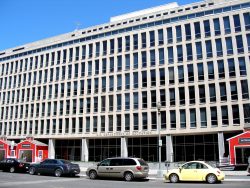Daniel L. Bennett is a Research Professor at the Baugh Center for Entrepreneurship and Free Enterprise at Baylor University.

Starting next January, some 35 very wealthy private colleges and universities will start paying an annual 1.4 percent college endowment tax under the new tax reform law. That’s very few of the nation’s institutions of higher learning, and the tax will not apply to assets that directly contribute to an educational purpose. When you hear […]
Read More
School is back in session but not much has changed in the world of higher education. Tuition continues to become less affordable, student debt continues to rise, and students increasingly face poor career prospects. Also resuming is the barrage of policy proposals claiming to offer silver-bullet solutions to all that ails higher education. The latest […]
Read More
A study by Vanderbilt suggests that the university spent $150 million complying with federal regulations during 2013-14. Although the details of how Vanderbilt arrived at these alarmingly figures have yet to be released, they should nonetheless be viewed as additional validation that the federal government’s overweening supervision of higher education is making college less affordable […]
Read More
Congress recently approved a bill to fund the government for the remainder of the fiscal year. It cuts Pell Grant funding 1.3%, from $22.8 to $22.5 billion. This reduction in the needs-based grant program will be reallocated to student loan service providers such as Navient and Nelnet, a move orchestrated by outgoing Senator Tom Harkin. […]
Read More
It’s definitely true, as Tom Friedman recently noted, that many graduates don’t possess the skills that today’s employers seek. Thankfully, some colleges have taken notice. They’re trying to address the skills gap either by boosting faculty-student mentorship programs or partnering with employers to better prepare students for the workforce. Fortunately, these ideas aren’t mutually exclusive. […]
Read More
Senator Tom Harkin continued his relentless attack on for-profit higher education this week by releasing a report condemning the sector. Specifically, Harkin laments for-profits’ success in enrolling military veterans and earning their Post 9/11 GI Bill revenues. Despite federal efforts to slow the sector’s growth, it successfully enrolled 31% of all veterans in 2012, up […]
Read More
Colleges are cashing in credential inflation. In a recent essay for The Chronicle of Higher Education, Kevin Carey notes that many “not-for-profit” colleges operate highly profitable terminal master’s programs in fields such as business administration, education, and public administration that are indistinguishable from the two-year vocational offerings of most “for-profit” colleges. He therefore argues that […]
Read More
The conventional wisdom among higher education historians is that government was uninvolved in the development of American higher education before the Civil War. In “Myth Busting: The Laissez Faire Origins of American Higher Education,” published recently in The Independent Review, I refute this view using a framework that compares the actual political economy during the […]
Read More
The White House yesterday unveiled what it is billing as an ambitious new plan to tackle college affordability. President Obama’s wish list amounts to an expansion of centralized state control over higher education, containing a hodge-podge of special-interest items masqueraded as reform First is a government college ranking system to be based on measures of […]
Read More
My colleague Richard Vedder once described former Undersecretary of the Department of Education Robert Shireman as “the only guy I ever met whose very appointment to public office destroyed hundreds of millions of dollars in wealth.” Of course, Vedder was referring to the rapid devaluation of publicly traded higher education firms’ stock prices that followed Shireman’s […]
Read More
In mid September, the Congressional duo of George Miller and John Tierney joined their Senate colleagues Tom Harkin and Dick Durbin and the Department of Education in what might be described as the ongoing Beltway Witch Trials, where the alleged witches are the colleges that are legally organized on a profit-making basis. Messrs. Miller and […]
Read More
“Academically Adrift“, a study by two sociologists – Richard Arum of NYU and Josipa Roksa of the University of Virginia – demonstrated that 36 percent of our college students graduate with little or no measurable gains in their core academic skills – areas like expository writing and analytical reasoning. Their diplomas are literally tickets to […]
Read More
Today the Obama Administration unveiled its long-anticipated and highly controversial final gainful employment (GE) regulation that ties program eligibility for federal student aid to new metrics that are based on student loan repayment rates. Under the new GE rule, a vocational program can qualify as leading to gainful employment and remain eligible for federal aid […]
Read More
In a recent article for Career College Central, I discuss the negative implications of the Department of Education’s (ED) proposal to alter the gainful employment rule to restrict the amount of money that a student could borrow by program of study and expected entry level occupational earnings. I identified three major flaws with the proposal. […]
Read More
By Daniel Bennett Thousands of students on more than a hundred college campuses joined together symbolically yesterday to protest sharp tuition hikes. The students pointed the finger at hard-pressed state and local governments. That was a mistake. State and local subsidies to public colleges and universities increased by 44% in real (inflation-adjusted) dollars during the […]
Read More